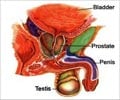Discover how AI has transformed prostate cancer diagnosis by identifying two new disease subtypes, promising a future of tailored treatments.

Genomic evolution shapes prostate cancer disease type
Go to source).
Revolutionizing Prostate Cancer Care with AI-Driven Discovery
The discovery was made by an international team led by the University of Oxford, and the University of Manchester, who applied AI (artificial intelligence) on data from DNA to identify two different subtypes affecting the prostate.TOP INSIGHT
Did you know? AI helps discover two new prostate cancer subtypes, potentially revolutionizing diagnosis, and personalized treatment. #AI #prostatecancer #medindia
According to Cancer Research UK, prostate cancer is the most common cancer affecting men in the UK with around 52,000 cases a year. Dr Rupal Mistry, the charity’s senior Science Engagement Manager, said:
“The work published today by this global consortium of researchers has the potential to make a real difference to people affected by prostate cancer. The more we understand about cancer the better chance we have of developing treatments to beat it. We are proud to have helped fund this cutting-edge work, which has laid the foundations for personalized treatments for people with prostate cancer, allowing more people to beat their disease.”
The ground-breaking research, which involved additional funding from Prostate Cancer Research and involved scientists from the University of Oxford, the University of Manchester, the University of East Anglia, and the Institute of Cancer Research, London, highlights how a prostate cancer diagnosis can affect physical, emotional and mental wellbeing.
Lead researcher Dr Dan Woodcock, of the Nuffield Department of Surgical Sciences at the University of Oxford, said: “Our research demonstrates that prostate tumors evolve along multiple pathways, leading to two distinct disease types.
Did You Know?
Prostate cancer affects one in eight men in their lifetime.
AI Uncovers New Prostate Cancer Types: A Treatment Revolution
The researchers used AI to study changes in the DNA of prostate cancer samples (using whole genome sequencing) from 159 patients.They went on to integrate all the information to generate an evolutionary tree showing how the two subtypes of prostate cancer develop, ultimately converging into two distinct disease types termed ‘evotypes’.
Professor David Wedge of Manchester Cancer Research Centre, who led the study, explained: “This realization is what enables us to distinguish the disease types. This hasn’t been done before because it’s more complicated than HER2+ in breast cancer, for instance.
"This understanding is pivotal as it allows us to classify tumors based on their evolutionary trajectory rather than solely on individual gene mutations or expression patterns."
Researcher Professor Colin Cooper, from UEA’s Norwich Medical School, highlighted that while prostate cancer is responsible for a large proportion of all male cancer deaths, it is more commonly a disease men die with rather than from. This means that unnecessary treatment can often be avoided, sparing men from side effects such as incontinence and impotence.
He added: “This study is really important because until now, we thought that prostate cancer was just one type of disease. But it is only now, with advancements in artificial intelligence, that we have been able to show that there are actually two different subtypes at play.
“We hope that the findings will not only save lives through better diagnosis and tailored treatments in the future, but they may help researchers working in other cancer fields better understand other types of cancer too.”
Dr. Naomi Elster, Director of Research at Prostate Cancer Research, said: “We simply don’t know enough about what a prostate cancer diagnosis means at present – there are many men who have a disease which is or may become aggressive and being able to treat aggressive disease more effectively is critical. But on the other side of the coin are too many men who live with side effects of cancer treatment they may never have needed.
“These results could be the beginning of us being able to take the same ‘divide and conquer’ approach to prostate cancer that has worked in other diseases, such as breast cancer.”
Reference:
- Genomic evolution shapes prostate cancer disease type - (https://www.sciencedirect.com/science/article/pii/S2666979X24000387?via%3Dihub)
 MEDINDIA
MEDINDIA




 Email
Email










